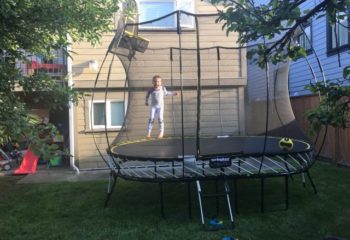Pamela Chan, Contributor
One day, while you’re in the first year of new motherhood, someone comes along and drops the conversational bomb.
“Did you know that Susie’s little Johnny can already count to 10?”
Seriously? Because your child has hardly said a word and now you’re hearing about Same Age Johnny. At the same time your conversation partner is asking if your child can count to 10. What? You haven’t been working on counting with your toddler? Why does this person want to tell you this nugget of information?
How about the colours? And then there’s crawling, eating solids, walking, talking in general, reading, writing, singing, playing the piano, smiling like the other children, perception of manners, denial of tantrums in other children, enthusiasm to set the table and helping out at home…. Gosh this list is getting long.
You might be thinking that this is a whole bunch of hyper sensitive nonsense but let’s unpack this topic a bit further. If a statement about the progress of another person’s child is married with inquiries about the progress of your own child, what’s the end goal here? Or how about the side glance when your child didn’t say “thank you” at the right moment, coupled with a comment about how nephew or neighbour Joey has the best manners.
Some people do not excel at being subtle.
Why do people make these comparisons? Some are anxious that you should be keeping your child up-to-speed. They question your judgment and parenting skills. Some are talkative types who don’t know when they’re speaking out of turn. Some think their approach is always better and you – as a new parent – need to be informed about the better way. Cue the descriptions about health care and how to feed, care for and discipline your child.
No amount of careful conversations or carefully worded online comments are going to change their perspective. What can you do in the face of such insensitivity? Breathe. Keep your head down. Say “my child is doing fine”, with confidence. Because you are confident that no matter what happens with your child, you don’t need to be making comparisons with other children. Don’t let other people drop a wet blanket on you and your partner’s parenting efforts. Don’t let others distract you from your parenting priorities. In the natural run of things, there are ways for you to find out if you really should be concerned.
Once you start to show too much interest in these comparisons, you start to focus too much on what other people and their children are doing. This will lead to unnecessary anxiety and distractions that will pull your attention in directions where it need not be.
It might annoy those who think they are seeing a better way, but you have to stake your territory. You’re fine with your parenting choices. Your child is doing fine. That’s nice to hear about so and so’s child, but everything is fine at your home. You’ve figured out what you want to do with your child’s feeding routine. You’re abreast of the latest information and you’re good. Thanks but you’re OK.
Make these statements often enough and others will stop weighing in on your parenting choices.
No, you don’t want to put your child in that early learning programme. Yes, you’re happy with how prepared they are for Kindergarten.
You’re good.
Your child is good.
And good is good enough.










9 Comments on “Please Stop the Comparisons {Parenting}”
YES! agreed 100% with this. I was guilty of doing this with my first. mind you it ended up she had autism and that is why she was far behind the other children in certain areas. but with my second daughter I do not compare as i know all children learn differently and at their own pace.
Love this post! Thanks for sharing! I hate when people ask those questions trying to show off their kids know more than mine or are more advanced!
usually when someone being so thoughtless realizes I have a teen, they stop with the comments comparing 2/3 year olds. Been there, done that……kids meet their milestones when they are good and ready.
Its so sad when you hear parents comparing kids,and sometimes with the kids right there…..
I’ve had 7 children who are all now adults and I can safely say that each child will progress at a rate suitable for them and only them. One of my kids walked at 9 1/2 on her own, another took 15 mths. Kids are just themselves and they definitely shouldn’t be pressured to do anything quicker, patience, it all comes in good time.
well said! every kid is different, as long as they are happy and healthy that is all that matters
Great advice! Every child, and every family, for that matter, are unique and so are their experiences.
I totally agree with this post by Pamela Chan. It may take a little courage to declare that your child is fine, and you may have to repeat it several or more times; but, eventually, the would-be-comparer will get the message
I was guilty of comparing my youngest child to his cousin, his best friend. He called me on it. I apologized for my lack of sensitively and all was well.
Giving your child confidence in his own abilities is so very important and comparison with others will hurt his/his progress in his/her sense of self-worth.
Each child is different and will develop at an individual pace, whether that is physical or mentally it’s the same thing. No two children are the same and that is something you should always bear in mind as a parent.